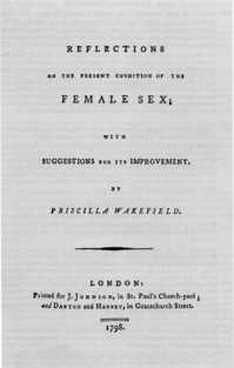Responding to Adam Smith
|
Priscilla Wakefield took for granted that all useful labour was productive labour, and that the labour of women, whether within the household or in the market sphere, was useful and productive.” So that "To devalue women’s labor was, in effect, to devalue women themselves". Robert Dimand, Brock University
Although Wakefield gave priority in her Reflections to women’s obligations and duties (rather than their rights, as had Mary Wollstonecraft a few years earlier), she also built a powerful argument for women’s education, skill development, and access to well-paid employments so that they might better fulfill their distinctive obligations. Karen Offen, Stanford University |
|
In Reflections on the present condition of the female sex published in 1798 Priscilla Wakefield contested Adam Smith’s male-centered views on Political Economy. 1n 1776 the Scottish philospher wrote Wealth of Nations which has become the basis of economic structures today. Priscilla Wakefield is believed to be the first woman to challenge Adam Smith's economic theory.
The observations which Priscilla Wakefield made over 200 years ago concerning the absence of women, and their contributions to the economy and society, in Adam Smith's thinking are as relevant today as in her time. Economics continues to ignore unpaid productive work, much of which is undertaken by women and in terms of both methodology and focus, views the world from the particular viewpoint of so called Economic Man or 'Homo Economicus'. As Katrine Marçal, author of Who cooked Adam Smith's dinner? a story about women and economics, wrote in 2012, Adam Smith may have said It is not from the benevolence of the butcher, the brewer, or the baker that we expect our dinner, but from their regard to their own interest, but he failed to include the person who shopped, prepared, cooked the dinner and cleared up afterwards. This is reflected globally in the failure to count key tasks undertaken mainly by women such as collecting water, caring for children, the elderly and the infirm, cooking for families, herding animals as productive work within economic theory, economic forecasts, the economic development of a country or in GDP measurements. One review of Marçal's book noted that attempts by Canada’s statistical office to put a value on uncompensated care came up with roughly one-third of the country’s annual G.D.P. As Christine Lagarde, at the time the French Finance Minister, noted during the global financial crash If Lehman Brothers had been Lehman Sisters, the financial crisis would have turned out differently. Priscilla Wakefield was an extremely practical woman who had experienced herself some of the problems facing women - in how to earn, to save, and also particularly the challenge of keeping those savings safe. Although Priscilla Wakefield lived in comfort in her early life, she married a man who was not good at business or resourceful, and the responsibility fell to her to earn the family income. She became an author at 43 writing 16 educational childrens' books over the next 20 years.
Despite her own worries her concern about the practical condition of poor women, and their vulnerability, led her to found a number of institutions in Tottenham. The lying-in charity in 1791, the School of Industry in 1792 to provide girls with practical skills as well as learning to read and write and to open the first Frugality Bank or Tottenham Female Benefit Club for women in October 1798, six months after the publication of Reflections on the female sex. She ensured that interest on deposits was provided, so that a benefit the wealthy had enjoyed for generations, was now available to humbler investors. Advocates of savings banks hoped that workers could escape their dependence on pawnbrokers, and rather than owing interest would benefit from earning interest on their savings. Within two decades, small local savings banks sprang up across Britain and by 1816 there were 74 savings banks. |
Extracts from Reflections on the present condition of the female sex:
It is asserted by Doctor Adam Smith, that every individual is a burthen [sic] upon the society to which he belongs, who does not contribute his share of productive labour for the good of the whole. The Doctor, when he lays down this principle, speaks in general terms of man, as a being capable of forming a social compact for mutual defence, and the advantage of the community at large. He does not absolutely specify, that both sexes, in order to render themselves beneficial members of society, are equally required to comply with these terms; but since the female sex is included in the idea of the species, and as women possess the same qualities as men, though perhaps in a different degree, their sex cannot free them from the claim of the public for their proportion of usefulness. That the major part of the sex, especially of those among the higher orders, neglect to fulfil this important obligation, is a fact that must be admitted, and points out the propriety of an enquiry into the causes of their deficiency. [pp. 1-3]
There appears then no moral impediment to prevent women from the application of their talents to purposes of utility; on the contrary, an improvement in public manners must infallibly result from it; as their influence over the other sex is universally acknowledged, it may be boldly asserted, that a conversion of their time from trifling and unproductive employments, to those that are both useful and profitable, would operate as a check upon luxury, dissipation, and prodigality, and retard the progress of that general dissoluteness, the offspring of idleness, which is deprecated by all political writers, as the sure forerunner of national decay. [pp. 69-70]
The knowledge of a trade is a probably means, which ought not to be neglected, of enabling them to give their assistance towards the support of their family; but should it be more eligible for the husband and the wife to unite in the prosecution of the same design, her former subjection to regular application will render her more apt in accommodating herself to her husband’s business. Thus the benefit of apprenticing girls of this rank to some trade is equally apparent, whether they marry or live single.
Men monopolize not only the most advantageous employments, and such as exclude women from the exercise of them, by the publicity of their nature, or the extensive knowledge they require, but even many of those, which are consistent with the female character. Another heavy discouragement to the industry of women, is the inequality of the reward of their labour, compared with that of men, an injustice which pervades every species of employment performed by both sexes. [pp. 150-151] The serving of retail shops, which deal in articles of female consumption, should be exclusively appropriated to women. For were the multitudes of men, who are constantly employed in measuring linen, gauze, ribbons, and lace; selling perfumes and cosmetics; setting a value on feathers and trinkets; and displaying their talents in praising the elegance of bonnets and caps, to withdraw, they might benefit the community, by exchanging such frivolous avocations for something more worthy of the masculine character, and by this measure afford an opportunity of gaining a creditable livelihood to many destitute women, whom a dreadful necessity drives to the business of prostitution. – The attendance of women in shops, need not be entirely confined to haberdashers, perfumers, and milliners; there are other trades in which they may be employed behind the counter: the familiar offices of trying on gloves and shoes, are more suitably performed by persons of the same sex. [pp. 164-165]
Feminism’s best-kept secret is just how necessary a feminist perspective is in searching for a solution to mainstream economic problems. Katrine Marçal |
|
Reflections on the present condition of the female sex
The book Reflection on the Present Condition of the Female Sex; with Suggestions for its Improvement was published in 1798 by the radical publisher Joseph Johnson. It is the only book by Priscilla Wakefield written for an adult audience. Review in the Monthly Visitor: An ingenious and useful publication, calculated to answer the end for which it was designed. Its style is cosy and pleasant, its sentiments rational and benevolent. The melioration of the condition of either sex is an object deserving of the utmost attention, and will receive that attention from every well constituted community. |
7 June 1798: ‘Reflections' published - I hope they will continue to procure a reputation as well as profit.
7 November 1798: My spirit for writing a little damped by hearing that the “British Critic” has treated my “Reflections” with slight if not with contempt, suggesting it refers only to Female Education. Priscilla Wakefield was disappointed that her ideas were seen as only applying to women, when like Mary Wollstonecraft she believed that improved opportunities for women would also bring benefits to men. |
Sources:
Priscilla Wakefield Reflection on the Present Condition of the Female Sex; with Suggestions for its Improvement 1798, (available through print-on-demand)
Karen Offen Talking Back to Power: An Articulate Englishwoman contests Adam Smith’s Male-centered Views about Political Economy, from Her Blueprint Blog (Her Blueprint is the blog of the former International Museum of Women, now part of Global Fund for Women)
Robert Dimand, “An Eighteenth-Century English Feminist Response to Political Economy: Priscilla Wakefield’s Reflections” (1798), in The Status of Women in Classical Economic Thought , ed. Robert Dimand & Chris Nyland (Aldershot: E. Elgar, 2003), pp. 194-205.
Adam Smith, Inquiry into the Nature and Causes of the Wealth of Nations (1776; frequently reprinted).
Katrine Marçal Who cooked Adam Smith's dinner? a story about women and economics Portobello Books, 2015
Priscilla Wakefield Reflection on the Present Condition of the Female Sex; with Suggestions for its Improvement 1798, (available through print-on-demand)
Karen Offen Talking Back to Power: An Articulate Englishwoman contests Adam Smith’s Male-centered Views about Political Economy, from Her Blueprint Blog (Her Blueprint is the blog of the former International Museum of Women, now part of Global Fund for Women)
Robert Dimand, “An Eighteenth-Century English Feminist Response to Political Economy: Priscilla Wakefield’s Reflections” (1798), in The Status of Women in Classical Economic Thought , ed. Robert Dimand & Chris Nyland (Aldershot: E. Elgar, 2003), pp. 194-205.
Adam Smith, Inquiry into the Nature and Causes of the Wealth of Nations (1776; frequently reprinted).
Katrine Marçal Who cooked Adam Smith's dinner? a story about women and economics Portobello Books, 2015
|
Frugality Bank
Tottenham Female Benefit Club and Children’s Bank: origins of Savings Banks in the UK
|
Microfinance
Why Priscilla Wakefield has been called the Mother of Microsavings
|
Economic justiceThe New Economy: a proposal from the Quaker community today for a more just economic system
|
Contact: [email protected]
|


